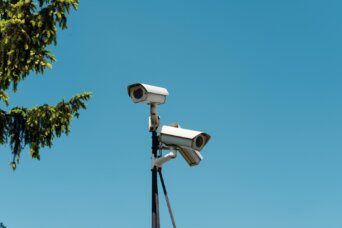- About
- Topics
- Picks
- Audio
- Story
- In-Depth
- Opinion
- News
- Donate
- Signup for our newsletterOur Editors' Best Picks.Send
Read, Debate: Engage.
| topic: | Discrimination |
|---|---|
| located: | India |
| editor: | Tish Sanghera |
Like many cities, India’s capital is bolstering its police force by investing in AI-powered facial recognition technology (FRT). However, research by the Vidhi Centre for Legal Policy, a think tank, shows that the wide-scale roll-out of this advanced technology could be cause for worry for Delhi's muslim community.
The use of FRT in areas with more police stations could further exacerbate an existing bias, the study suggests - namely that of over-policing muslim communities.
"There are a few biases inherent in policing, including that policing disproportionately targets some groups of people," researchers said. "This bias remains when new technology is applied to such a system. The victims of policing technology’s shortcomings will more likely be these disproportionately targeted groups."
The researchers claim that the use of FRT will “almost disproportionately affect Muslims” because of the high concentration of muslim people in over-policed areas, along with the “historical biases in policing muslim communities in India in general and in Delhi in particular.”
FRT, which is being rolled out across multiple police forces in the country, presents a danger of compounding existing prejudices in a society that’s already fractured along religious, social, political and gender lines. How could this tech-enabled policing affect homeless populations, sex workers or displaced refugees? Could the use of FRT be used to track, surveil and further harass those living in the margins?
Though police and different government agencies are increasingly seeking to integrate FRT into domestic law enforcement practices, concerns around privacy and transparency are yet to be fully debated in India. India presently does not have a well-defined data protection legislation, meaning that technology with the ability to create a mass surveillance network is being rolled out without due consideration - which may even be unconstitutional. According to policy experts, the Indian constitution enshrines the right to privacy which FRTs could infringe upon due to the huge amounts of data they collect.
After the January 2020 protests against the discriminatory Citizenship Amendment Act, FRT was reportedly used to target and charge protestors, thus “demonstrating a disconcerting alacrity of law enforcement,” says Ameen Jauhar, Senior Resident Fellow at the Vidhi Center for Legal Policy.
With India’s current legal and ethical landscape for data privacy as unregulated as the Wild West, there is nothing to prevent police from using FRT to crack down on protests and, with it, the right to free speech - a trend which human rights activists have long been worried about.
Whether or not India follows neighbouring China’s lead on using FRT surveillance on their multi-billion citizen population will be a major test of India’s civil society.
Photo by Michał Jakubowski

